PESTEL Analysis of Airbnb
VerifiedAdded on 2019/10/09
|8
|2017
|132
Report
AI Summary
This report conducts a PESTEL analysis of Airbnb, a prominent player in the shared economy. The analysis examines the political, economic, social, technological, environmental, and legal factors influencing Airbnb's operations. The political section highlights legal challenges related to housing regulations and taxation across various jurisdictions. Economically, Airbnb's impact is analyzed through its contribution to job creation and economic activity in different regions. The social aspect focuses on Airbnb's role in connecting cultures and fostering community through its platform. The technological dependence of Airbnb's operations is discussed, emphasizing its reliance on technology for bookings, communication, and user verification. Environmentally, the report explores Airbnb's contribution to sustainable tourism and resource optimization. Finally, the legal section reiterates the ongoing challenges related to compliance with housing laws and regulations. The conclusion summarizes Airbnb's overall impact and future prospects, acknowledging both its successes and the need for continued adaptation to regulatory environments.
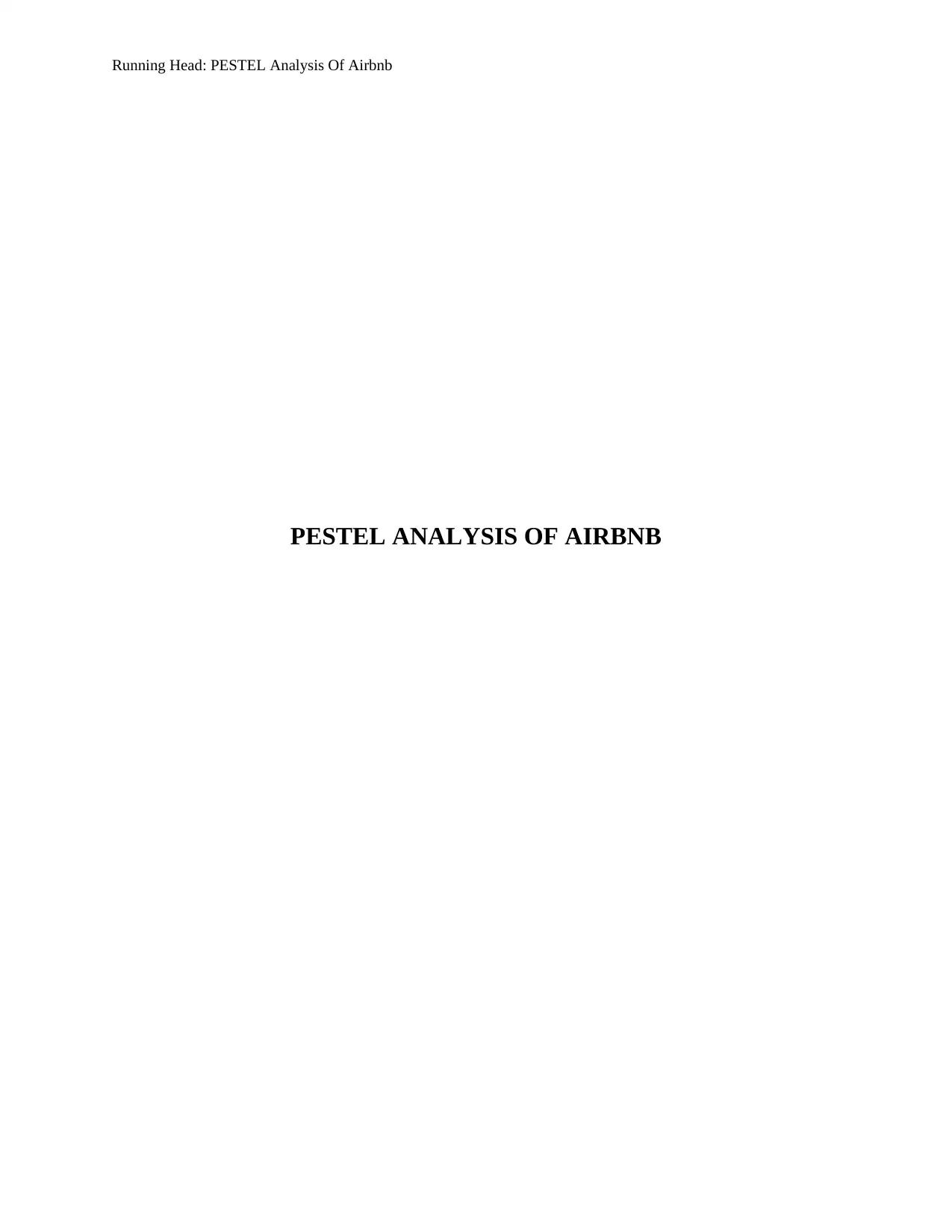
Running Head: PESTEL Analysis Of Airbnb
PESTEL ANALYSIS OF AIRBNB
PESTEL ANALYSIS OF AIRBNB
Paraphrase This Document
Need a fresh take? Get an instant paraphrase of this document with our AI Paraphraser
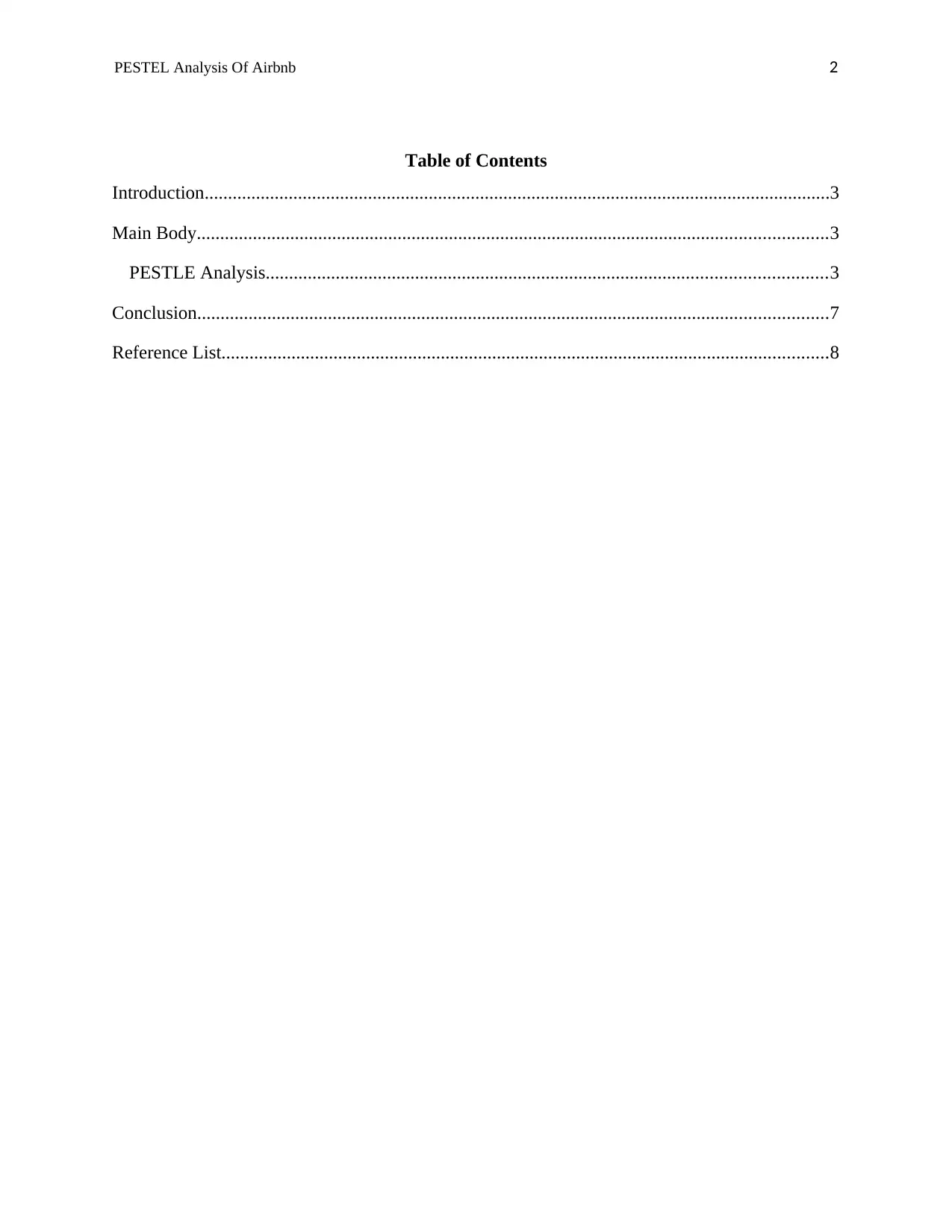
PESTEL Analysis Of Airbnb 2
Table of Contents
Introduction......................................................................................................................................3
Main Body.......................................................................................................................................3
PESTLE Analysis........................................................................................................................3
Conclusion.......................................................................................................................................7
Reference List..................................................................................................................................8
Table of Contents
Introduction......................................................................................................................................3
Main Body.......................................................................................................................................3
PESTLE Analysis........................................................................................................................3
Conclusion.......................................................................................................................................7
Reference List..................................................................................................................................8
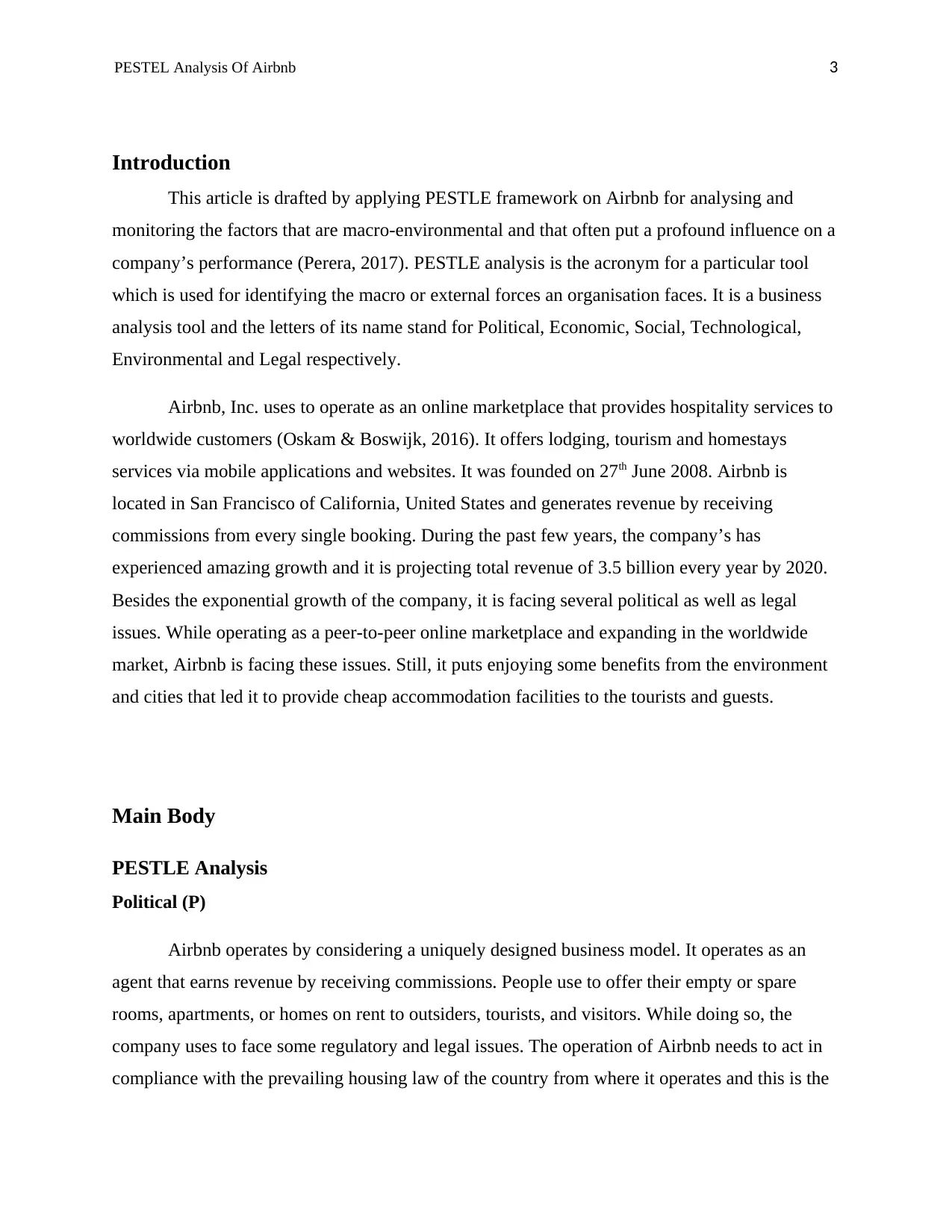
PESTEL Analysis Of Airbnb 3
Introduction
This article is drafted by applying PESTLE framework on Airbnb for analysing and
monitoring the factors that are macro-environmental and that often put a profound influence on a
company’s performance (Perera, 2017). PESTLE analysis is the acronym for a particular tool
which is used for identifying the macro or external forces an organisation faces. It is a business
analysis tool and the letters of its name stand for Political, Economic, Social, Technological,
Environmental and Legal respectively.
Airb n b , In c. uses to operate as an online marketplace that provides hospitality services to
worldwide customers (Oskam & Boswijk, 2016). It offers lodging, tourism and homestays
services via mobile applications and websites. It was founded on 27th June 2008. Airbnb is
located in San Francisco of California, United States and generates revenue by receiving
commissions from every single booking. During the past few years, the company’s has
experienced amazing growth and it is projecting total revenue of 3.5 billion every year by 2020.
Besides the exponential growth of the company, it is facing several political as well as legal
issues. While operating as a peer-to-peer online marketplace and expanding in the worldwide
market, Airbnb is facing these issues. Still, it puts enjoying some benefits from the environment
and cities that led it to provide cheap accommodation facilities to the tourists and guests.
Main Body
PESTLE Analysis
Political (P)
Airbnb operates by considering a uniquely designed business model. It operates as an
agent that earns revenue by receiving commissions. People use to offer their empty or spare
rooms, apartments, or homes on rent to outsiders, tourists, and visitors. While doing so, the
company uses to face some regulatory and legal issues. The operation of Airbnb needs to act in
compliance with the prevailing housing law of the country from where it operates and this is the
Introduction
This article is drafted by applying PESTLE framework on Airbnb for analysing and
monitoring the factors that are macro-environmental and that often put a profound influence on a
company’s performance (Perera, 2017). PESTLE analysis is the acronym for a particular tool
which is used for identifying the macro or external forces an organisation faces. It is a business
analysis tool and the letters of its name stand for Political, Economic, Social, Technological,
Environmental and Legal respectively.
Airb n b , In c. uses to operate as an online marketplace that provides hospitality services to
worldwide customers (Oskam & Boswijk, 2016). It offers lodging, tourism and homestays
services via mobile applications and websites. It was founded on 27th June 2008. Airbnb is
located in San Francisco of California, United States and generates revenue by receiving
commissions from every single booking. During the past few years, the company’s has
experienced amazing growth and it is projecting total revenue of 3.5 billion every year by 2020.
Besides the exponential growth of the company, it is facing several political as well as legal
issues. While operating as a peer-to-peer online marketplace and expanding in the worldwide
market, Airbnb is facing these issues. Still, it puts enjoying some benefits from the environment
and cities that led it to provide cheap accommodation facilities to the tourists and guests.
Main Body
PESTLE Analysis
Political (P)
Airbnb operates by considering a uniquely designed business model. It operates as an
agent that earns revenue by receiving commissions. People use to offer their empty or spare
rooms, apartments, or homes on rent to outsiders, tourists, and visitors. While doing so, the
company uses to face some regulatory and legal issues. The operation of Airbnb needs to act in
compliance with the prevailing housing law of the country from where it operates and this is the
⊘ This is a preview!⊘
Do you want full access?
Subscribe today to unlock all pages.

Trusted by 1+ million students worldwide
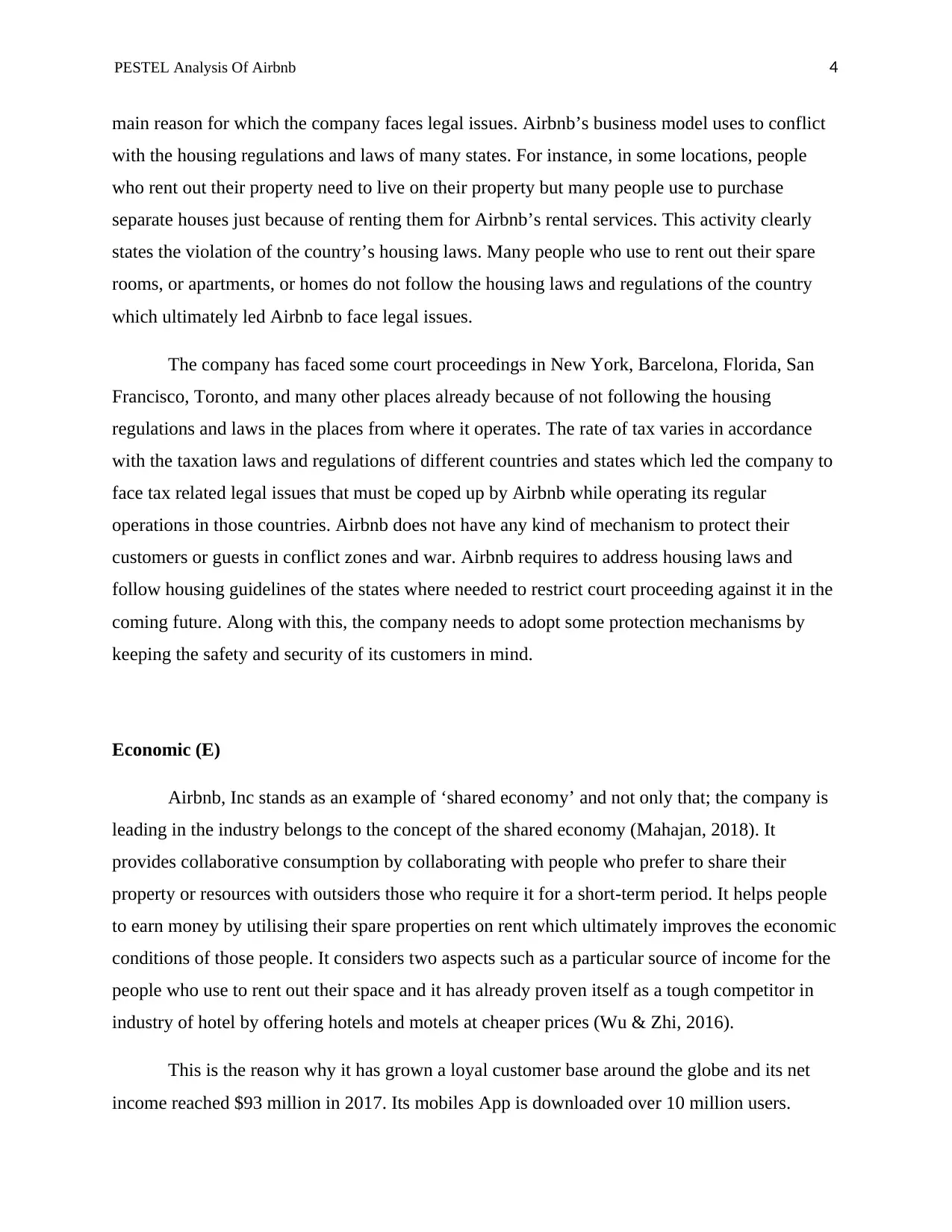
PESTEL Analysis Of Airbnb 4
main reason for which the company faces legal issues. Airbnb’s business model uses to conflict
with the housing regulations and laws of many states. For instance, in some locations, people
who rent out their property need to live on their property but many people use to purchase
separate houses just because of renting them for Airbnb’s rental services. This activity clearly
states the violation of the country’s housing laws. Many people who use to rent out their spare
rooms, or apartments, or homes do not follow the housing laws and regulations of the country
which ultimately led Airbnb to face legal issues.
The company has faced some court proceedings in New York, Barcelona, Florida, San
Francisco, Toronto, and many other places already because of not following the housing
regulations and laws in the places from where it operates. The rate of tax varies in accordance
with the taxation laws and regulations of different countries and states which led the company to
face tax related legal issues that must be coped up by Airbnb while operating its regular
operations in those countries. Airbnb does not have any kind of mechanism to protect their
customers or guests in conflict zones and war. Airbnb requires to address housing laws and
follow housing guidelines of the states where needed to restrict court proceeding against it in the
coming future. Along with this, the company needs to adopt some protection mechanisms by
keeping the safety and security of its customers in mind.
Economic (E)
Airbnb, Inc stands as an example of ‘shared economy’ and not only that; the company is
leading in the industry belongs to the concept of the shared economy (Mahajan, 2018). It
provides collaborative consumption by collaborating with people who prefer to share their
property or resources with outsiders those who require it for a short-term period. It helps people
to earn money by utilising their spare properties on rent which ultimately improves the economic
conditions of those people. It considers two aspects such as a particular source of income for the
people who use to rent out their space and it has already proven itself as a tough competitor in
industry of hotel by offering hotels and motels at cheaper prices (Wu & Zhi, 2016).
This is the reason why it has grown a loyal customer base around the globe and its net
income reached $93 million in 2017. Its mobiles App is downloaded over 10 million users.
main reason for which the company faces legal issues. Airbnb’s business model uses to conflict
with the housing regulations and laws of many states. For instance, in some locations, people
who rent out their property need to live on their property but many people use to purchase
separate houses just because of renting them for Airbnb’s rental services. This activity clearly
states the violation of the country’s housing laws. Many people who use to rent out their spare
rooms, or apartments, or homes do not follow the housing laws and regulations of the country
which ultimately led Airbnb to face legal issues.
The company has faced some court proceedings in New York, Barcelona, Florida, San
Francisco, Toronto, and many other places already because of not following the housing
regulations and laws in the places from where it operates. The rate of tax varies in accordance
with the taxation laws and regulations of different countries and states which led the company to
face tax related legal issues that must be coped up by Airbnb while operating its regular
operations in those countries. Airbnb does not have any kind of mechanism to protect their
customers or guests in conflict zones and war. Airbnb requires to address housing laws and
follow housing guidelines of the states where needed to restrict court proceeding against it in the
coming future. Along with this, the company needs to adopt some protection mechanisms by
keeping the safety and security of its customers in mind.
Economic (E)
Airbnb, Inc stands as an example of ‘shared economy’ and not only that; the company is
leading in the industry belongs to the concept of the shared economy (Mahajan, 2018). It
provides collaborative consumption by collaborating with people who prefer to share their
property or resources with outsiders those who require it for a short-term period. It helps people
to earn money by utilising their spare properties on rent which ultimately improves the economic
conditions of those people. It considers two aspects such as a particular source of income for the
people who use to rent out their space and it has already proven itself as a tough competitor in
industry of hotel by offering hotels and motels at cheaper prices (Wu & Zhi, 2016).
This is the reason why it has grown a loyal customer base around the globe and its net
income reached $93 million in 2017. Its mobiles App is downloaded over 10 million users.
Paraphrase This Document
Need a fresh take? Get an instant paraphrase of this document with our AI Paraphraser
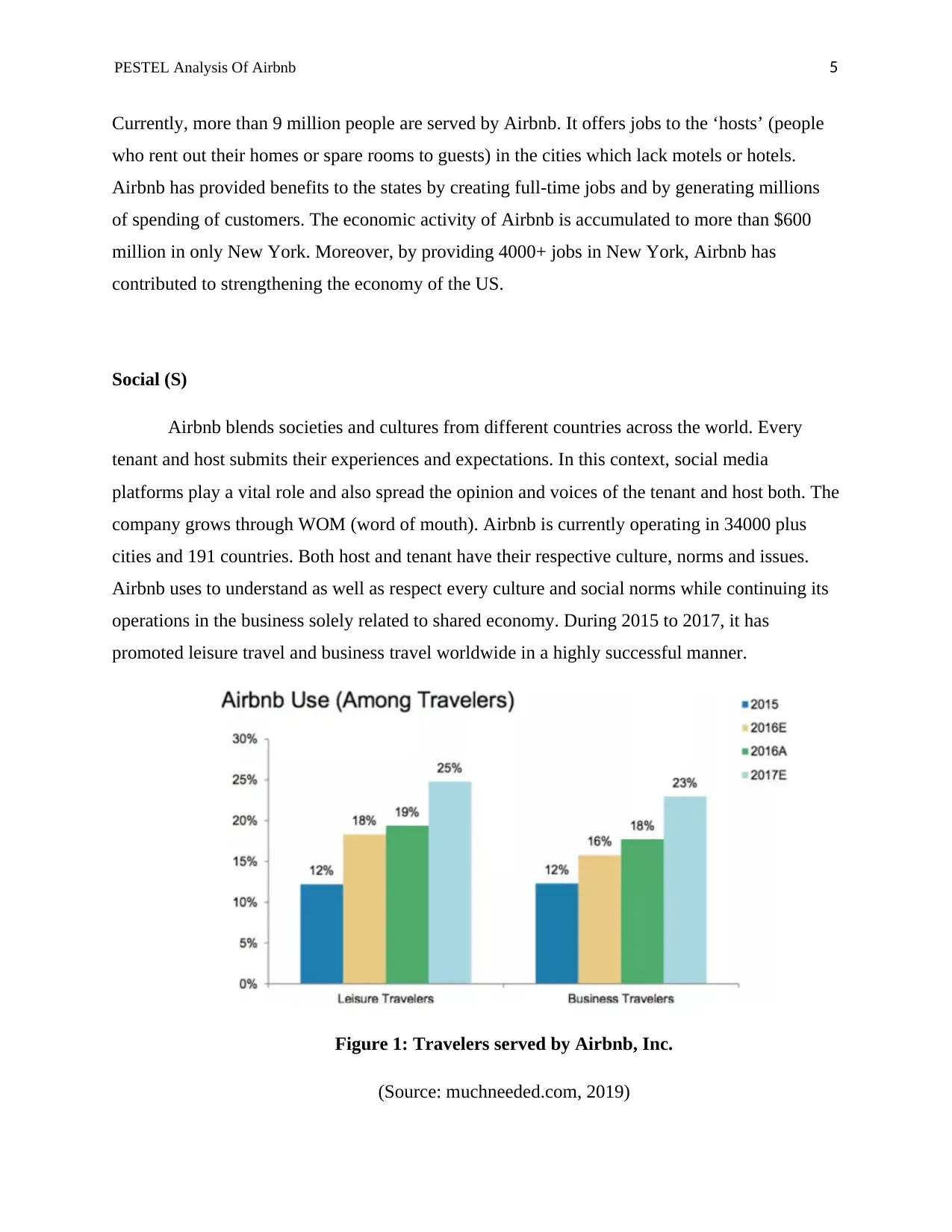
PESTEL Analysis Of Airbnb 5
Currently, more than 9 million people are served by Airbnb. It offers jobs to the ‘hosts’ (people
who rent out their homes or spare rooms to guests) in the cities which lack motels or hotels.
Airbnb has provided benefits to the states by creating full-time jobs and by generating millions
of spending of customers. The economic activity of Airbnb is accumulated to more than $600
million in only New York. Moreover, by providing 4000+ jobs in New York, Airbnb has
contributed to strengthening the economy of the US.
Social (S)
Airbnb blends societies and cultures from different countries across the world. Every
tenant and host submits their experiences and expectations. In this context, social media
platforms play a vital role and also spread the opinion and voices of the tenant and host both. The
company grows through WOM (word of mouth). Airbnb is currently operating in 34000 plus
cities and 191 countries. Both host and tenant have their respective culture, norms and issues.
Airbnb uses to understand as well as respect every culture and social norms while continuing its
operations in the business solely related to shared economy. During 2015 to 2017, it has
promoted leisure travel and business travel worldwide in a highly successful manner.
Figure 1: Travelers served by Airbnb, Inc.
(Source: muchneeded.com, 2019)
Currently, more than 9 million people are served by Airbnb. It offers jobs to the ‘hosts’ (people
who rent out their homes or spare rooms to guests) in the cities which lack motels or hotels.
Airbnb has provided benefits to the states by creating full-time jobs and by generating millions
of spending of customers. The economic activity of Airbnb is accumulated to more than $600
million in only New York. Moreover, by providing 4000+ jobs in New York, Airbnb has
contributed to strengthening the economy of the US.
Social (S)
Airbnb blends societies and cultures from different countries across the world. Every
tenant and host submits their experiences and expectations. In this context, social media
platforms play a vital role and also spread the opinion and voices of the tenant and host both. The
company grows through WOM (word of mouth). Airbnb is currently operating in 34000 plus
cities and 191 countries. Both host and tenant have their respective culture, norms and issues.
Airbnb uses to understand as well as respect every culture and social norms while continuing its
operations in the business solely related to shared economy. During 2015 to 2017, it has
promoted leisure travel and business travel worldwide in a highly successful manner.
Figure 1: Travelers served by Airbnb, Inc.
(Source: muchneeded.com, 2019)
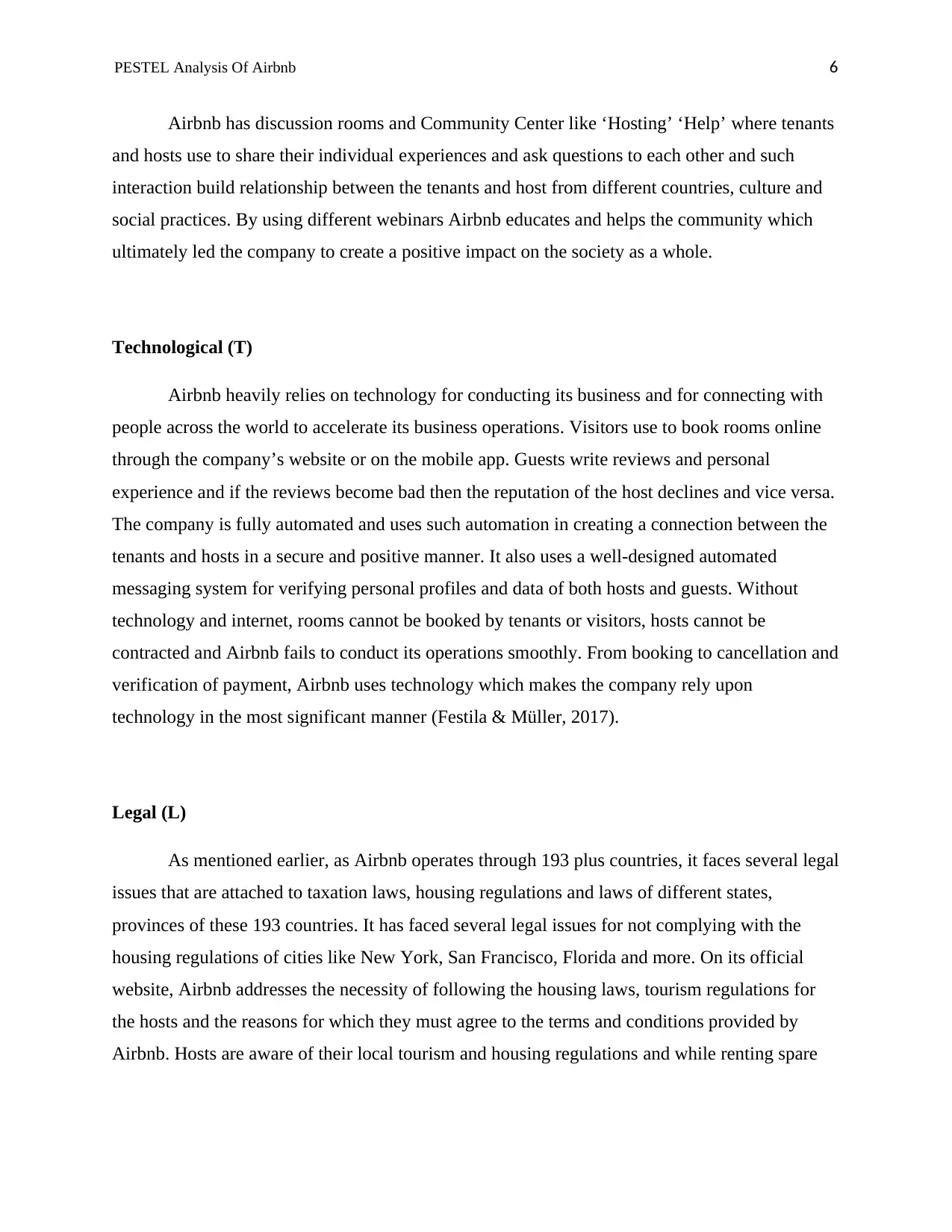
PESTEL Analysis Of Airbnb 6
Airbnb has discussion rooms and Community Center like ‘Hosting’ ‘Help’ where tenants
and hosts use to share their individual experiences and ask questions to each other and such
interaction build relationship between the tenants and host from different countries, culture and
social practices. By using different webinars Airbnb educates and helps the community which
ultimately led the company to create a positive impact on the society as a whole.
Technological (T)
Airbnb heavily relies on technology for conducting its business and for connecting with
people across the world to accelerate its business operations. Visitors use to book rooms online
through the company’s website or on the mobile app. Guests write reviews and personal
experience and if the reviews become bad then the reputation of the host declines and vice versa.
The company is fully automated and uses such automation in creating a connection between the
tenants and hosts in a secure and positive manner. It also uses a well-designed automated
messaging system for verifying personal profiles and data of both hosts and guests. Without
technology and internet, rooms cannot be booked by tenants or visitors, hosts cannot be
contracted and Airbnb fails to conduct its operations smoothly. From booking to cancellation and
verification of payment, Airbnb uses technology which makes the company rely upon
technology in the most significant manner (Festila & Müller, 2017).
Legal (L)
As mentioned earlier, as Airbnb operates through 193 plus countries, it faces several legal
issues that are attached to taxation laws, housing regulations and laws of different states,
provinces of these 193 countries. It has faced several legal issues for not complying with the
housing regulations of cities like New York, San Francisco, Florida and more. On its official
website, Airbnb addresses the necessity of following the housing laws, tourism regulations for
the hosts and the reasons for which they must agree to the terms and conditions provided by
Airbnb. Hosts are aware of their local tourism and housing regulations and while renting spare
Airbnb has discussion rooms and Community Center like ‘Hosting’ ‘Help’ where tenants
and hosts use to share their individual experiences and ask questions to each other and such
interaction build relationship between the tenants and host from different countries, culture and
social practices. By using different webinars Airbnb educates and helps the community which
ultimately led the company to create a positive impact on the society as a whole.
Technological (T)
Airbnb heavily relies on technology for conducting its business and for connecting with
people across the world to accelerate its business operations. Visitors use to book rooms online
through the company’s website or on the mobile app. Guests write reviews and personal
experience and if the reviews become bad then the reputation of the host declines and vice versa.
The company is fully automated and uses such automation in creating a connection between the
tenants and hosts in a secure and positive manner. It also uses a well-designed automated
messaging system for verifying personal profiles and data of both hosts and guests. Without
technology and internet, rooms cannot be booked by tenants or visitors, hosts cannot be
contracted and Airbnb fails to conduct its operations smoothly. From booking to cancellation and
verification of payment, Airbnb uses technology which makes the company rely upon
technology in the most significant manner (Festila & Müller, 2017).
Legal (L)
As mentioned earlier, as Airbnb operates through 193 plus countries, it faces several legal
issues that are attached to taxation laws, housing regulations and laws of different states,
provinces of these 193 countries. It has faced several legal issues for not complying with the
housing regulations of cities like New York, San Francisco, Florida and more. On its official
website, Airbnb addresses the necessity of following the housing laws, tourism regulations for
the hosts and the reasons for which they must agree to the terms and conditions provided by
Airbnb. Hosts are aware of their local tourism and housing regulations and while renting spare
⊘ This is a preview!⊘
Do you want full access?
Subscribe today to unlock all pages.

Trusted by 1+ million students worldwide
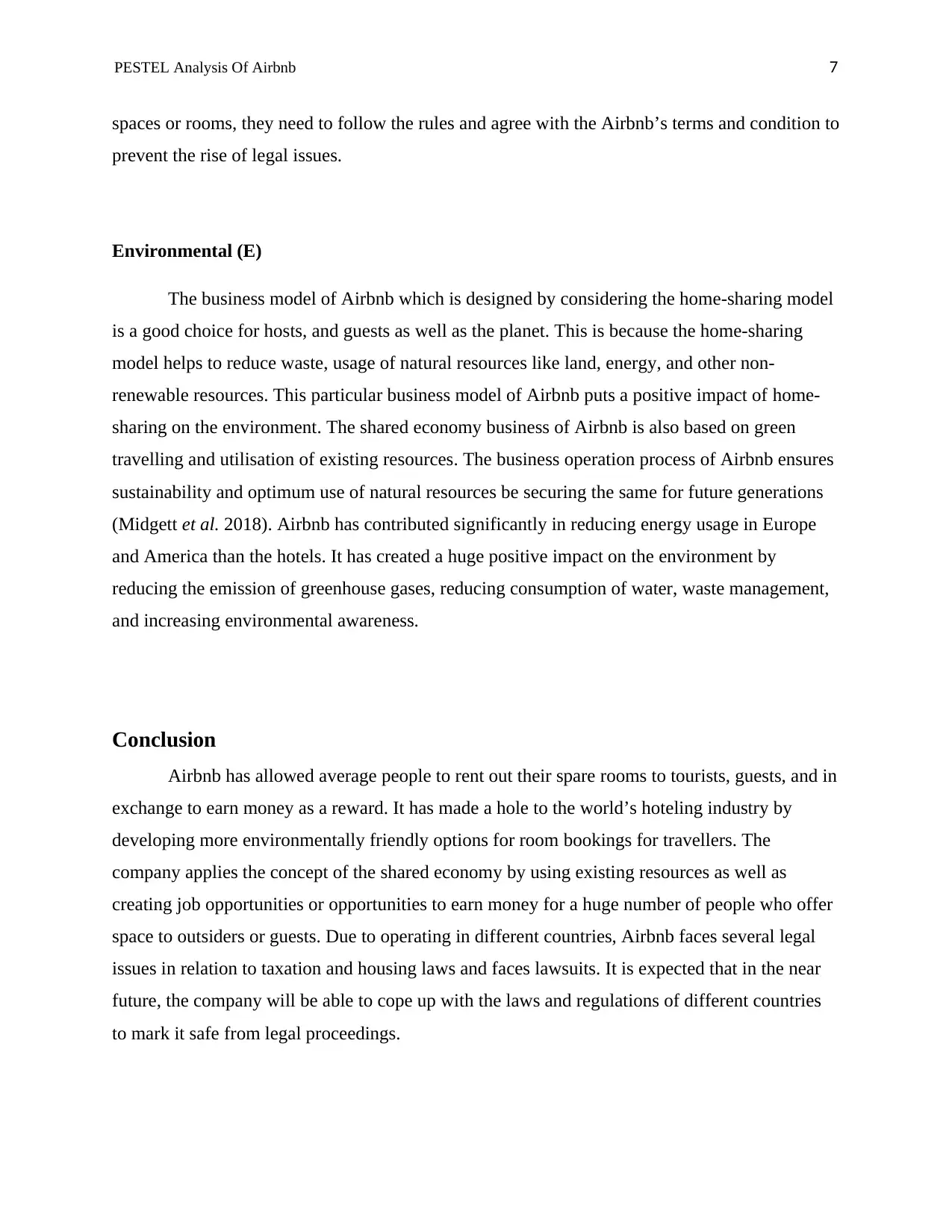
PESTEL Analysis Of Airbnb 7
spaces or rooms, they need to follow the rules and agree with the Airbnb’s terms and condition to
prevent the rise of legal issues.
Environmental (E)
The business model of Airbnb which is designed by considering the home-sharing model
is a good choice for hosts, and guests as well as the planet. This is because the home-sharing
model helps to reduce waste, usage of natural resources like land, energy, and other non-
renewable resources. This particular business model of Airbnb puts a positive impact of home-
sharing on the environment. The shared economy business of Airbnb is also based on green
travelling and utilisation of existing resources. The business operation process of Airbnb ensures
sustainability and optimum use of natural resources be securing the same for future generations
(Midgett et al. 2018). Airbnb has contributed significantly in reducing energy usage in Europe
and America than the hotels. It has created a huge positive impact on the environment by
reducing the emission of greenhouse gases, reducing consumption of water, waste management,
and increasing environmental awareness.
Conclusion
Airbnb has allowed average people to rent out their spare rooms to tourists, guests, and in
exchange to earn money as a reward. It has made a hole to the world’s hoteling industry by
developing more environmentally friendly options for room bookings for travellers. The
company applies the concept of the shared economy by using existing resources as well as
creating job opportunities or opportunities to earn money for a huge number of people who offer
space to outsiders or guests. Due to operating in different countries, Airbnb faces several legal
issues in relation to taxation and housing laws and faces lawsuits. It is expected that in the near
future, the company will be able to cope up with the laws and regulations of different countries
to mark it safe from legal proceedings.
spaces or rooms, they need to follow the rules and agree with the Airbnb’s terms and condition to
prevent the rise of legal issues.
Environmental (E)
The business model of Airbnb which is designed by considering the home-sharing model
is a good choice for hosts, and guests as well as the planet. This is because the home-sharing
model helps to reduce waste, usage of natural resources like land, energy, and other non-
renewable resources. This particular business model of Airbnb puts a positive impact of home-
sharing on the environment. The shared economy business of Airbnb is also based on green
travelling and utilisation of existing resources. The business operation process of Airbnb ensures
sustainability and optimum use of natural resources be securing the same for future generations
(Midgett et al. 2018). Airbnb has contributed significantly in reducing energy usage in Europe
and America than the hotels. It has created a huge positive impact on the environment by
reducing the emission of greenhouse gases, reducing consumption of water, waste management,
and increasing environmental awareness.
Conclusion
Airbnb has allowed average people to rent out their spare rooms to tourists, guests, and in
exchange to earn money as a reward. It has made a hole to the world’s hoteling industry by
developing more environmentally friendly options for room bookings for travellers. The
company applies the concept of the shared economy by using existing resources as well as
creating job opportunities or opportunities to earn money for a huge number of people who offer
space to outsiders or guests. Due to operating in different countries, Airbnb faces several legal
issues in relation to taxation and housing laws and faces lawsuits. It is expected that in the near
future, the company will be able to cope up with the laws and regulations of different countries
to mark it safe from legal proceedings.
Paraphrase This Document
Need a fresh take? Get an instant paraphrase of this document with our AI Paraphraser
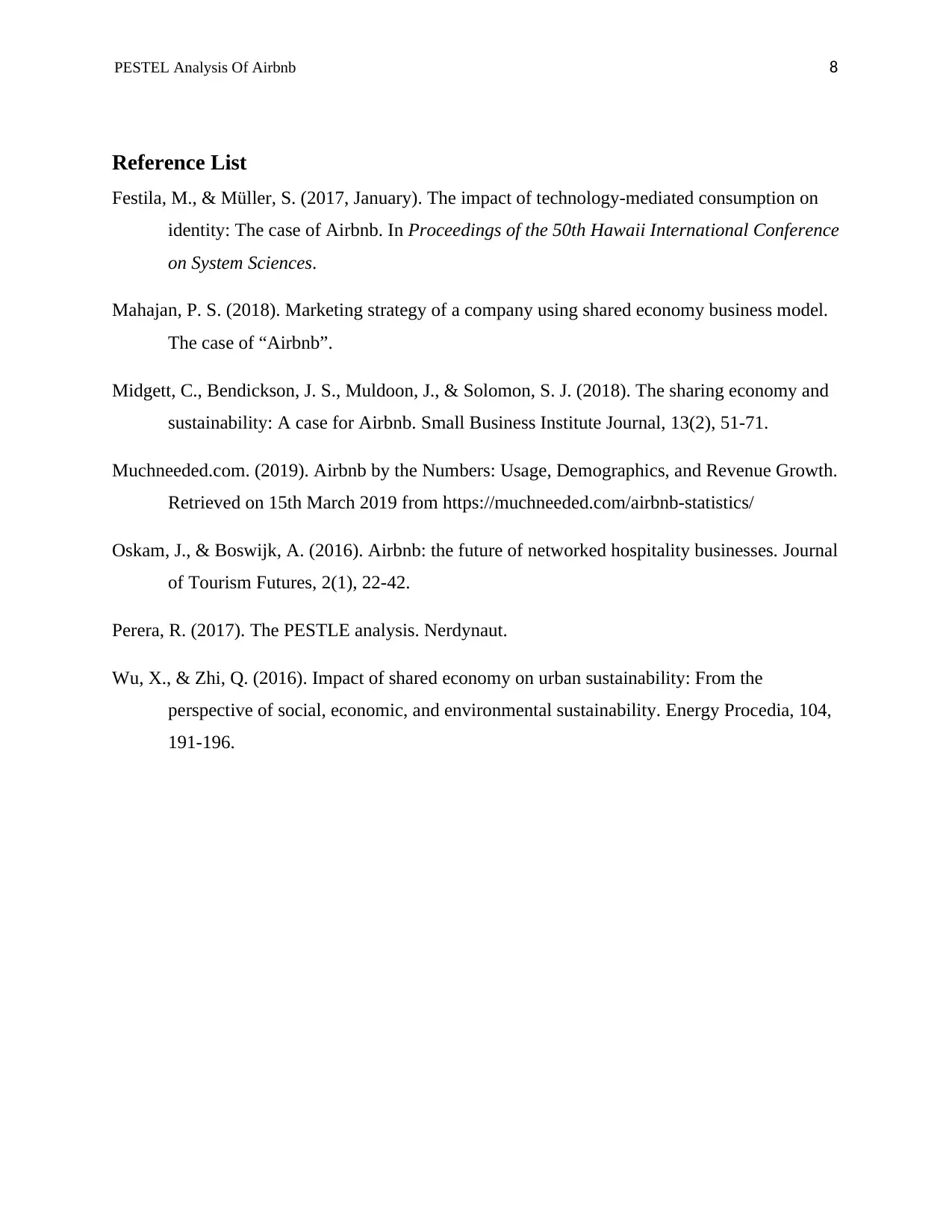
PESTEL Analysis Of Airbnb 8
Reference List
Festila, M., & Müller, S. (2017, January). The impact of technology-mediated consumption on
identity: The case of Airbnb. In Proceedings of the 50th Hawaii International Conference
on System Sciences.
Mahajan, P. S. (2018). Marketing strategy of a company using shared economy business model.
The case of “Airbnb”.
Midgett, C., Bendickson, J. S., Muldoon, J., & Solomon, S. J. (2018). The sharing economy and
sustainability: A case for Airbnb. Small Business Institute Journal, 13(2), 51-71.
Muchneeded.com. (2019). Airbnb by the Numbers: Usage, Demographics, and Revenue Growth.
Retrieved on 15th March 2019 from https://muchneeded.com/airbnb-statistics/
Oskam, J., & Boswijk, A. (2016). Airbnb: the future of networked hospitality businesses. Journal
of Tourism Futures, 2(1), 22-42.
Perera, R. (2017). The PESTLE analysis. Nerdynaut.
Wu, X., & Zhi, Q. (2016). Impact of shared economy on urban sustainability: From the
perspective of social, economic, and environmental sustainability. Energy Procedia, 104,
191-196.
Reference List
Festila, M., & Müller, S. (2017, January). The impact of technology-mediated consumption on
identity: The case of Airbnb. In Proceedings of the 50th Hawaii International Conference
on System Sciences.
Mahajan, P. S. (2018). Marketing strategy of a company using shared economy business model.
The case of “Airbnb”.
Midgett, C., Bendickson, J. S., Muldoon, J., & Solomon, S. J. (2018). The sharing economy and
sustainability: A case for Airbnb. Small Business Institute Journal, 13(2), 51-71.
Muchneeded.com. (2019). Airbnb by the Numbers: Usage, Demographics, and Revenue Growth.
Retrieved on 15th March 2019 from https://muchneeded.com/airbnb-statistics/
Oskam, J., & Boswijk, A. (2016). Airbnb: the future of networked hospitality businesses. Journal
of Tourism Futures, 2(1), 22-42.
Perera, R. (2017). The PESTLE analysis. Nerdynaut.
Wu, X., & Zhi, Q. (2016). Impact of shared economy on urban sustainability: From the
perspective of social, economic, and environmental sustainability. Energy Procedia, 104,
191-196.
1 out of 8
Related Documents
Your All-in-One AI-Powered Toolkit for Academic Success.
+13062052269
info@desklib.com
Available 24*7 on WhatsApp / Email
![[object Object]](/_next/static/media/star-bottom.7253800d.svg)
Unlock your academic potential
Copyright © 2020–2026 A2Z Services. All Rights Reserved. Developed and managed by ZUCOL.



